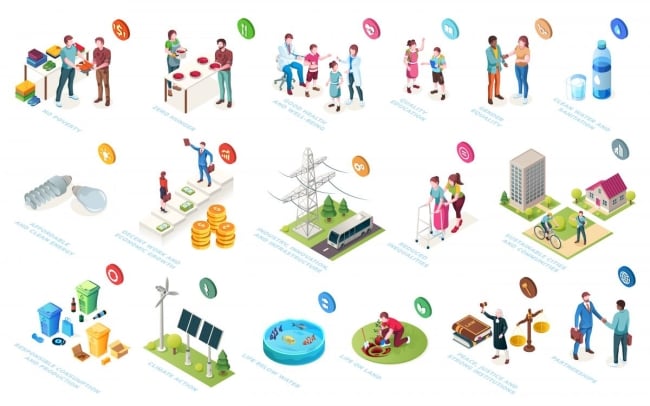You have /5 articles left.
Sign up for a free account or log in.

United Nations member states adopted 17 sustainable development goals in 2015.
ISTOCK.COM/Oleksandr Pupko
Carnegie Mellon University may be the first university to conduct a review of how its teaching, research and practices align with the United Nations-adopted sustainable development goals.
The review attempts to map how the university's varied activities align with each of the 17 SDGs, also known as the Global Goals, which focus on elimination of poverty and hunger, environmental sustainability and climate action, access to clean water, gender equality, quality education, and other areas.
“The challenge at a place like a university where you have so many different people and so many different initiatives is in fact even knowing what all do we have going on across the broad ideas of sustainability,” said James H. Garrett, the provost at Carnegie Mellon, which has satellite campuses in Australia, Rwanda, Qatar, New York City, Silicon Valley and Washington, D.C. in addition to its main campus in Pittsburgh. “The sustainable development goals really provided an excellent framework in which to think about and organize ourselves in this broad concept of environmental sustainability, but also social justice and equity.”
In conducting what it terms a voluntary university review, Carnegie Mellon employed a range of methods. A team that included students, professors and staff reviewed published information about Carnegie Mellon activities, including websites, reports and strategic plans; cataloged relevant spring 2020 course offerings; analyzed research publications dating from 2018 to 2020 using a software program, Dimensions, that employed an artificial intelligence algorithm to tag relevant articles; reviewed student organizations; and consulted with faculty, students and staff, including during one-hour Zoom meetings organized for each of the SDGs. A total of 157 unique individuals participated in the 17 Zoom consultations.
The authors of the review make no claim for comprehensiveness. The team writes that the initial findings “will be supplemented by additional information provided by CMU community members over the coming academic year. Even with the acknowledged limitations and caveats of the initial inventory effort, the compiled data and information provides useful and informative insights into SDGs where there is a lot of activity at CMU and areas where there are opportunities to do much more.”
The authors turned up some areas where the university has more activities than other. They found, for example, that activities related to SDG 4 (quality education) and SDG 8 (decent work and economic growth) “were most numerous, which is unsurprising for an educational institution that employs many people. Activities related to SDG 11 (sustainable cities and communities) also were identified abundantly across the three mission categories, reflecting CMU's urban presence and longstanding urban focus in education, research, and practice.”
To take an example of one goal -- SDG 10 (reduced inequalities) -- the review identified 51 spring 2020 courses, mostly relating to policy, ethics and psychology, relevant to this topic. The Dimensions software tagged 12 research articles, mostly in economics, as relevant, though the authors note they believe that “many CMU publications related to SDG 10 were not tagged in Dimensions.” The review also identified activities related to Carnegie Mellon’s diversity and inclusion efforts and hiring practices as practices relevant to this goal.
The UN’s sustainable development goals were adopted in 2015 with a target date of achieving them by 2030. Since their development, nations and cities have conducted voluntary reviews of their progress toward the goals.
“We're now five years into the sustainable development goals, and as part of that process nations would volunteer to report on their progress on the SDGs at the UN,” said Krista Rasmussen, a senior research associate of policy planning at the United Nations Foundation, an American nonprofit organization that advances UN goals. “However, in those five years where we’ve seen a lot of innovation and action has been at the local level.”
Rasmussen said Carnegie Mellon's efforts embody the “community-driven approach to achieving the SDGs. They really have identified and translated this somewhat complex framework into a usable way for a university to pursue this that is driven by the community, meaning students, professors. It’s a great model for other universities to use.”
One challenge Carnegie Mellon found was a lack of awareness about the goals. Fifty-six percent of students at the Pittsburgh campus who responded to a survey in February said they were not aware of the SDGs. However, more than half of the survey respondents requested follow-up communication.
"This response indicated that there was interest from certain members of the community, but overall awareness about the SDGs at CMU campuses around the world was quite low," the review states.
Alexandra Hiniker, executive fellow for sustainability initiatives at Carnegie Mellon, described a process of awareness raising.
"If you come at people and say, 'oh, there was this thing that … was created at the UN, everyone's obligated to do,' understandably people aren’t as interested in it, because it seems like some external thing that’s pushed upon them," she said. "But I think by showing people how what they're already doing is related to the goals and then building up from there, that we’re really able to demonstrate the value of using the sustainable development goals framework."
"This is really an opportunity, not an obligation, for CMU to engage in internal and external discussions about the issues that are covered by the Global Goals, but that takes time," she said. "It takes engagement and explaining it to people."
Hiniker described the review as "a process, not a product."
"Now is the exciting part where we get to see what we're doing and figure out how we can amplify the work that's contributing to the goals," she said. "And then how can we find ways for different parts of the university to work together to move those areas of work forward?"








